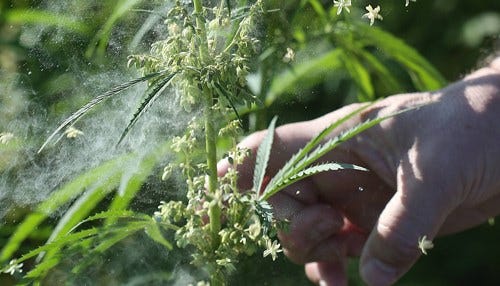Hoosier Farmers Eyeing Hemp as Next Cash Crop
 (Image Courtesy of Purdue University.)
(Image Courtesy of Purdue University.)
Subscriber Benefit
As a subscriber you can listen to articles at work, in the car, or while you work out. Subscribe NowAs of July 1, it’s legal to grow hemp as an agriculture commodity in Indiana. Purdue University is using its resources to ensure farmers have the tools they need to succeed if they choose to grow the crop. “Hemp production can be challenging, so it is important that we provide education about agronomic practices, pest and weed management, marketing and the legality behind growing hemp,” said Marguerite Bolt, Purdue Extension’s first hemp specialist.
Purdue Crop Diagnostic Training and Research Center and the Midwest Hemp Council recently co-hosted a hemp field day. The 200 attendees learned about hemp licensing, agronomic practices and difficulties in growing the crop.
Hemp is different than its cousin, marijuana. Hemp does not contain the psychoactive substance THC which makes people high.
“Growing hemp is similar to other row crops in some ways and dramatically different in others. Hemp presents its own unique challenges,” said Mark Boyer, farmer and owner of Healthy Hoosier Oil LLC.
Interest in the crop has climbed in Indiana since the General Assembly legalized the production of hemp. But Bolt says one of the biggest challenges is finding a commercial processor for farmers to haul their harvested crop. “It’s not an open market, so you need to have a contract with a processor who will take the crop before you start.” Bolt urges anyone considering getting into hemp farming to do their homework.
Bolt says despite the renewed interest in hemp, it’s not a new crop to this country.
